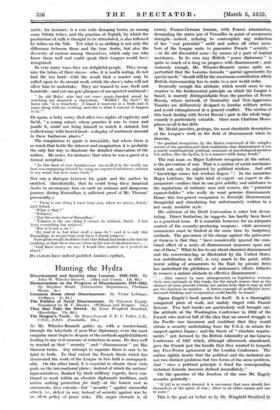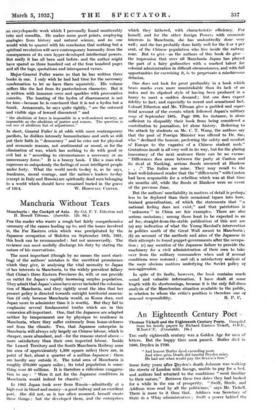Hunting the Hydra.
Disarmament and Security since LoCamo. 2925-1931. By Common. Sense about Disarmament. By. .,Victor Lefebure., (Gollancz. Is. 6d.) The Politics of Naval Disarmament. BY Giovanni Engel y.
Translated by H. V. Rhodes. (Williams and Norgate. las.) They that Take the Sword. By Esme Wingfield Stratford.
(Routledge. Its. 6d.)
AS Mr. Wheeler-Bennett guides us,. with a master-hand, through the labyrinth of post-War diplomacy, even the most sanguine must begin to despair of the methods applied hitherto leading to any real measure of reduction in arms. He 'does well to remind us that " security " and " disarmament " are like Siamese twins. Any attempt to separate them is sure to be fatal to both. To that extent the French thesis which has dominated the work of the League in this field is unimpeach- able. On the other hand, it is essential to situate these twin goals on the international plane ; instead of which the nations' representatives, flanked by their *military experts, have con- tinued to work within an obsolete diplomatic tradition, each nation seeking protection for itself—at the lowest cost, in armaments, bien entendu—but " security " against successful attack, i.e., defeat in war, instead of security against War by on all-in pnlici of peace risks The major obstacle is, of course, Franco-German tension, with France adamantine, demanding the stains quo Of Versailles in point of armaments strength—indeed, refusing to contemplate any reduetion Of her "war potential" until and unless all other Mem- bers of the League unite to guarantee French " Security " —in the old discredited 'sense—by Means of d pact of mutual assistance. In its . own way British "peace diplomacy" is quite as much of a drag on progress with disarmament.; and, curiously enough, Mr. Wheeler-Bennett seems quite un- perturbed that the Locamo formula "special agreements for special needs " should stillbe the maximum Contribution which British 'statesmanship has to make to a new' world' order. ' Ironically enough this attitude, which would seem to run counter to the fundamental principle on which the League is based, is scarcely distinguishable from the pinetiee of Soviet Hassle,- Whew network of Neutrality and Non-Aggression Treaties are deliberately designed to localize military actien and avoid entanglement in a general conflict. The section of this book dealing With Soviet Russia's part in the whole tragi- comedy is particularly valuable: Once more Chatham House places us all in her debt.
Mr:Heald provides, perhaps, the most charitable description of the League's work in the field of disarmament when he discerns,
"the gradual recognition by the States concerned of the complex nature of the question and their realization that disarmament is not a purely Mathematical, political, economic or psychological-problem but rather, like the hydra, it is a monster with many heads."
The real issue, as Major Lefebure recognizes at the outset, is the prevention of war. That is a matter of social mechanics which can only be adjusted by political wisdom. And still 'knowledge comes but wisdom lingers" I In the meantime Major Lefebure, the right kind of expert—an expert in dis- armament—realizes that he can give solidity and substance to the aspirations of ordinary men and women, the "potential cannon-fodder" who really do want genuine disarmament. Hence this low-priced companion to Scientific Disarmament, thoughtful and stimulating but unfortunately written in a
not easily readable style. .
His criticism of the Draft Convention is sober but devas- tating. Direct limitation, he suggests, has hardly been faced as a practical issue. It is essential, however, for an adequate control of the casualtyproducing weapons ; while accessory armaments must be limited at the same time by budgetary methods. The gravamen of his charge against the .palaverers at Geneva is that they "have consistently ignored the com- bined effect of a series of disarmament measures upon any one of them." What he has to say about chemical disarmament and the conversion-hag, as illustrated by the ;United States war mobilization in 1917, is very much to the point, while recent selling of armaments to the East by private (inns has underlined the pitifulness of statesmen's, efforts hitherto to remove a serious obstaele_tn effective disarmament: . . they cannot by sane arrangements . or legislation restrain their own nationals in this tirade, for the siMple reason that in the absence of some general scheme' ono station feels that it may as well get the business as another.• A better example of inefficient inter- national thinking and co-operation could hardly be found." _ Signor Engely's book speaks for itself. . It is a thoroughly competent piece of work, not unduly tinged with Fascist fervour. Two bad breaks are particularly well brought out, the attitude at the Washington. Conference in 1922. of the French who arrived full of the idea that an armed struggle in the Pacific was imminent and confident that they would obtain a security undertaking from the U.S.A. in return for support against Japan ; and the thesis of "absolute require- ments" put forward by the British Admiralty at the Geneva Conference of 1027 which, although afterwards abandoned, gave the French just the handle that they wanted to torpedo any Five-Power agreement at the London Conference. The author rightly insists that the political and the technical are not two distinct problems but two forms of the same problem, that "once a political principle is fixed the corresponding technical formula becomes defined immediately."
On the question of the freedom of the at Mr. Engely remarks pointedly : ".If [it] is in truth desired, it is necessary that men should free themselves of the spirit of war ; there is no other means and can bo,none."
This ktlte,goaIset before u6 by Pr. 'Wingfield Stratford in
an encyclopaedic Work which I personally found unutterably trite and maudlin. He makes some good points, employing analogies from history and natural science, and no one wiiuld wish to quarrel with his conclusion that nothing but a spiritual revolution will save. contemporary humanity from the consequences of its own hyper--deVeloped intellectual powers. But really it has all been said before, and the author might have spared us three hundred out of the four hundred pages anciall the tags, quotations and interspersed verses.
Major-General Fuller warns us that he has written three books in one.; I only wish he had had time for the necessary condensation to let us have them separately. His volume suffers like the last from its Pantechnicon character. But it is written with immense verve and sparkles with provocative conceits. The hunting of the hydra of disarmament is not for him—because he is convinced that it is not a hydra but a Snack. Armaments, he says quite rightly, "are the outward and visible. sign of inward discontent" and " the abolition of force is impossible in a well-ordered society, as impossible as the abolition of justice and reason. The question is not one of abolition but of adjustment."
In short, General Fuller is at odds with most contemporary pacifists, he dislikes intensely humanitarians and such as still put their faith in " democracy " and he Cries out for physical and economic reasons, not sentimental or moral, or for the elimination of war, which has nothing to do with good or evil but is" according to circumstances a necessary or an unnecessary force." It is a breezy book. I like a man who expresses so outspokenly the feelings of most intelligent people under forty. What the world needs to-day is, as he says, frankness, moral courage, and the nation's leaders to-day (except in Italy and Russia) are spiritually dead men belonging to a world which should have remained buried in the grave



















































 Previous page
Previous page